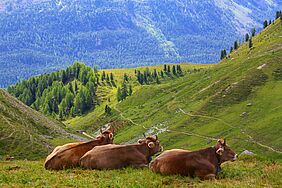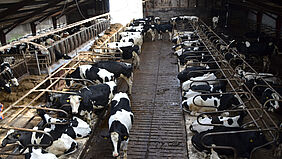Transforming Europe’s food system to meet the EU Green Deal goal of becoming the first carbon-neutral continent by 2050 is no small task. Globally, agriculture causes about one-third of all greenhouse gases (GHG). In Europe, nearly 70% of all EU agricultural GHG emissions come from livestock-based farming; therefore, production and supply chains must undergo radical change to become more sustainable.
PATHWAYS, a Horizon 2020 Research and Innovation Action project, will contribute to the EU’s Farm-to-Fork strategy, which is at the heart of the EU Green Deal. PATHWAYS will design transition pathways that address societal demands for the provision of resilient, safe, nutritious and affordable livestock-based food. At the same time, environmental impacts should be reduced, and the sustainability of the European livestock sector should be furthered. The project’s innovative practice hubs and living labs will cover dairy, pork, beef, poultry, sheep and goat livestock sectors. PATHWAYS has received 9 million Euros intending to make these goals a reality.
New sustainability assessment that takes the ecosystem into account
Catherine Pfeifer, a sustainability expert at FiBL Switzerland, is looking forward to the challenge of developing a new way of assessing sustainability as part of PATHWAYS: "We urgently need novel sustainability metrics to assess the impact of livestock production. Today, we rely on efficiency-based metrics considering the impact per kilogram of animal-sourced products, which generally rate organic products worse than conventional ones."
The following example illustrates this problem: A cow grazing on the pasture is less efficient and emits more greenhouse gases per liter of milk than a high-performance cow fed on concentrates. From this perspective, the high-performance cow is more efficient. Yet this overlooks the fact that this high-performance cow might be kept in a too intensive system, beyond the carrying capacities of the local ecosystems, which can, for example, lead to nutrient overload in soils and water. Therefore, accounting for the local carrying capacities of the ecosystem must be included in sustainability assessments of livestock in the future. "We are therefore developing a new approach to assess whether livestock is produced within the carrying capacity of a local ecosystem, based on geographical and climatic data", says Catherine Pfeifer. "These additional sustainability metrics will contribute to a much more differentiated debate on the role of livestock in sustainable food systems."
Employing a multi-level sustainability assessment framework, the FiBL project team helps to gain a better understanding of key performance indicators, including impacts on productivity, biodiversity, health and welfare, GHG emissions, human nutrition, trade and economics, and ecosystem services.
Setting a good example
As sustainability concerns could influence markets for livestock-based products in the coming decades, PATHWAYS will inform policy and industry to support a circular bioeconomy with animal products playing a part in future diets. Its interactive, online platform and policy toolkit will provide user-friendly instruments for a range of stakeholders, including consumers. PATHWAYS will push forward the global competitiveness of Europe in climate action by improving the sustainability of its production and value chains to inspire other regions around the world.
The project coordinators from the Swedish University of Agricultural Sciences (SLU), Harry Blokhuis and Laurence Smith, state: "Clearly, livestock system redesign is required at all levels to stay within planetary boundaries whilst supporting the needs of growing populations. PATHWAYS will support this transition by demonstrating best practices and providing smart tools, levers, and metrics. We bring together leading experts in food systems research and innovation to develop timely and effective recommendations for policy and practice."
Further information
Contact
Links
- pathways-project.com: Webpage of the project PATHWAYS
- nature.com: Study in the science magazine Nature: "One-third of our greenhouse gas emissions come from agriculture"
- ec.europa.eu: The European Green Deal
- ec.europa.eu: The Farm to Fork strategy of the EU
About PATHWAYS
Coordinated by the Swedish University of Agricultural Sciences (SLU), this 5-year (2021-2026) €9 million Horizon 2020 project contributes to the EU Farm-to-Fork Strategy, which is at the heart of the EU Green Deal. FiBL is involved in work packages 3, 4, 5 and 6 and leads packages 3.1, 4.1, 5.2, 6.2 and 6.3. In total, PATHWAYS involves 28 partners from 12 countries, including universities, research institutes, NGOs, think tanks, SMEs, industry associations, and multi-nationals – mobilising stakeholders along every step of the food value chain.
Intending to reduce environmental impacts while addressing societal demands for safe, nutritious and affordable meat and dairy products, PATHWAYS aims to identify and increase sustainable practices along the supply and production chains of the European livestock sector.





